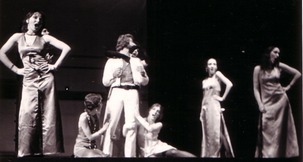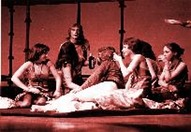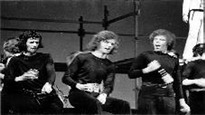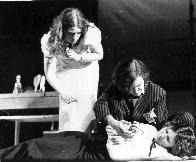
For me, it all started with this man.
Shouldn't that be John Gay? Well, not just yet - we'll get to him later. As I said, the story really started with Charles Dickens.
A few years ago, I wrote an adaptation of Dickens' A Christmas Carol set to the music of Arthur Sullivan. This piece, called A Savoy Christmas Carol, is available for production, and if you want more details, go to the website at www.xmas-carol.co.uk. A Savoy Christmas Carol is published by Lazy Bee Scripts, who you can contact via their website at www.lazybeescripts.co.uk.
I had been pleased to discover that one critic was ‘surprised and delighted’ that Sullivan’s music fitted so well into the style of Dickens’ masterpiece. This lead me to consider whether Sullivan’s music could again be used, this time as the basis for an adaptation of The Beggar’s Opera.

I first found the Beggar’s Opera in 1974 when I was at London University, and put on a modern dress production at Queen Mary College. I adapted John Gay's original script, attempting to introduce topical political satire (it was at the time of the Watergate scandal in the USA), and to replace the 18th century allusions, no longer understood by modern audiences.
This production was originally conducted by acclaimed musician, Howard Williams, but over the years, his original adaptations of the music have been lost, and sadly, so has the original script which I adapted. But the photographs of the production still survive, and you can see some of them included throughout the text.
Many years later, the Concept Players put on a production of A Chorus of Disapproval by Alan Ayckbourn, and by chance, I was the only member of the cast who had taken part in a previous production of the Beggar’s Opera. I volunteered to arrange the music for the various excerpts used in the play, and the cast (and hopefully the audience) enjoyed these so much that I was encouraged to suggest that at some point we should put on a full production of the original.

So I started again, nearly thirty years later, on a second adaptation. This piece is the final result, and I hope this new version gives you as much pleasure as it has me.
I took the same approach that I took with my adaptation of A Savoy Christmas Carol, looking for suitable items of Sullivan's music to match the mood and circumstances of the play. I then tried to match Gay's original words to Sullivan's music, and where this was impossible, I looked at Gilbert's original words to see if they could be used or adapted. As a last resort, I wrote new lyrics to fit the music and the required mood.
As with A Savoy Christmas Carol, I originally intended the piece as a small contribution to the list of shows that the traditional G&S society would be interested in putting on, since the number of Gilbert and Sullivan's originals in the canon is so retricted.
During the process of adaptation, I have modified the language of Gay's original to remove much of the archaic vocabulary and structure, but hopefully not so much as to make it sound too modern.

I have introduced occasional anachronisms (such as mobile phones in the list of stolen goods), all of which can be removed if the intention is to perform the piece in ‘period’, but which can be left in, or replaced with more appropriate items depending on the character of the production. If the director should decide to set it in the present, the names of the highwaymen can of course be changed (if desired) to introduce elements of current political satire. Naturally, I wouldn't dream of comparing any politician of modern times to such a licentious and corrupt character as Macheath.
In the first part of the play, I have made the Beggar take on the role of Filch, under the pretext that he needs to be part of the action to ensure that the actors do not dilute his ‘moral’. He initially acts as a sort of narrator/intermediary between the action and the audience, to explain some of the unfamiliar ways of the period (eg to impeach a criminal, and to have him hanged brought a fee of forty pounds, but to hang a woman in similar circumstances attracted no reward). As the piece progresses, Filch continues to appear in various small roles, checking that the actors remain faithful to his script.
In order to take advantage of Sullivan’s choral writing, I have placed the chorus on stage throughout the piece, in various guises. In those scenes where they play no direct part, they should remain as spectators, very much as I imagine the Beggar of the original would have seen them in the ‘Great Room at St Giles’, or as fellow prisoners watching the drama of Macheath unfold in Newgate Jail.

I have used Gay’s words (modified where appropriate) where these could be fitted to Sullivan’s music, and I have drafted in modified lines from some of the other traditional ballads which I had to remove from the piece. In some cases, Gilbert’s original words fitted so perfectly that it would have been perverse to have changed them at all. In the last resort, I have written lyrics of my own.
As a nod to the original, you may be able to find some of the traditional melody lines press-ganged into use in some of the short scene change musical episodes.
I hope you enjoy it as much as I have putting it together.
Nigel Holloway
February 2013